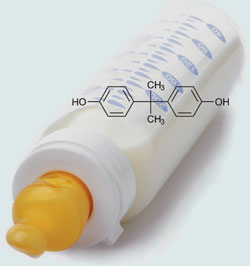Early in 2008 polycarbonate bottles containing bisphenol A (BPA) have been deemed “toxic” under the Canadian Environmental Protection Act. The compound was first identified by researchers that autoclaved (heat sterilized) their polycarbonate flasks. They were studying the growth of breast cancer cells and found that the chemical which was identified from the flasks promoted growth of breast cancer cells. No human research was involved, and the data come from tests in animal research. Nevertheless BPA is an “endocrine disruptor”, that mimics the action of estrogen, reports Dr.Rebecca Sherlock, clinical assistant professor of pediatrics at the University of British Columbia. The question that remained was the leaching of the substance into food. As an experiment, bottles with the content of BPA were subjected to conditions that simulate household use. They were run through regular household dishwashers, but they also were subjected to the use of industrial dishwashers that have higher temperatures. Also the bottles were subjected to scrubbing with steel wool. Dr. Sherlock reported that the final result is that there is leaching of the substance into foods. None of the studies showed that the quantity of BPA is higher than the acceptable daily intake limit set in the U.S.A. and in Europe.
There are animal results that there may be some health effects, especially in the brain, the prostate and other endocrine tissues. Due to these results the federal Health Minister has proposed a ban on manufacture, import, and sale of baby bottles. Newborn babies and infants may be more sensitive to the effects of the chemical. A lot of controversy has surrounded the polycarbonate bottles containing bisphenol A.
In August the FDA has declared them “safe’, but by September a report from the National Institutes of Environmental Health Sciences cited once again “some concern”. There are potential effects on the behavior, brain and prostate gland in fetuses, infants and children at the current exposure level.
More information about toxins in the environment: https://www.askdrray.com/protecting-yourself-from-environmental-toxins/
85th Annual Conference of The Canadian Pediatric Society (CPS) in Victoria/BC as reported by The Medical Post, Sept. 16, 2008, p. 14
Last edited November 6, 2014






